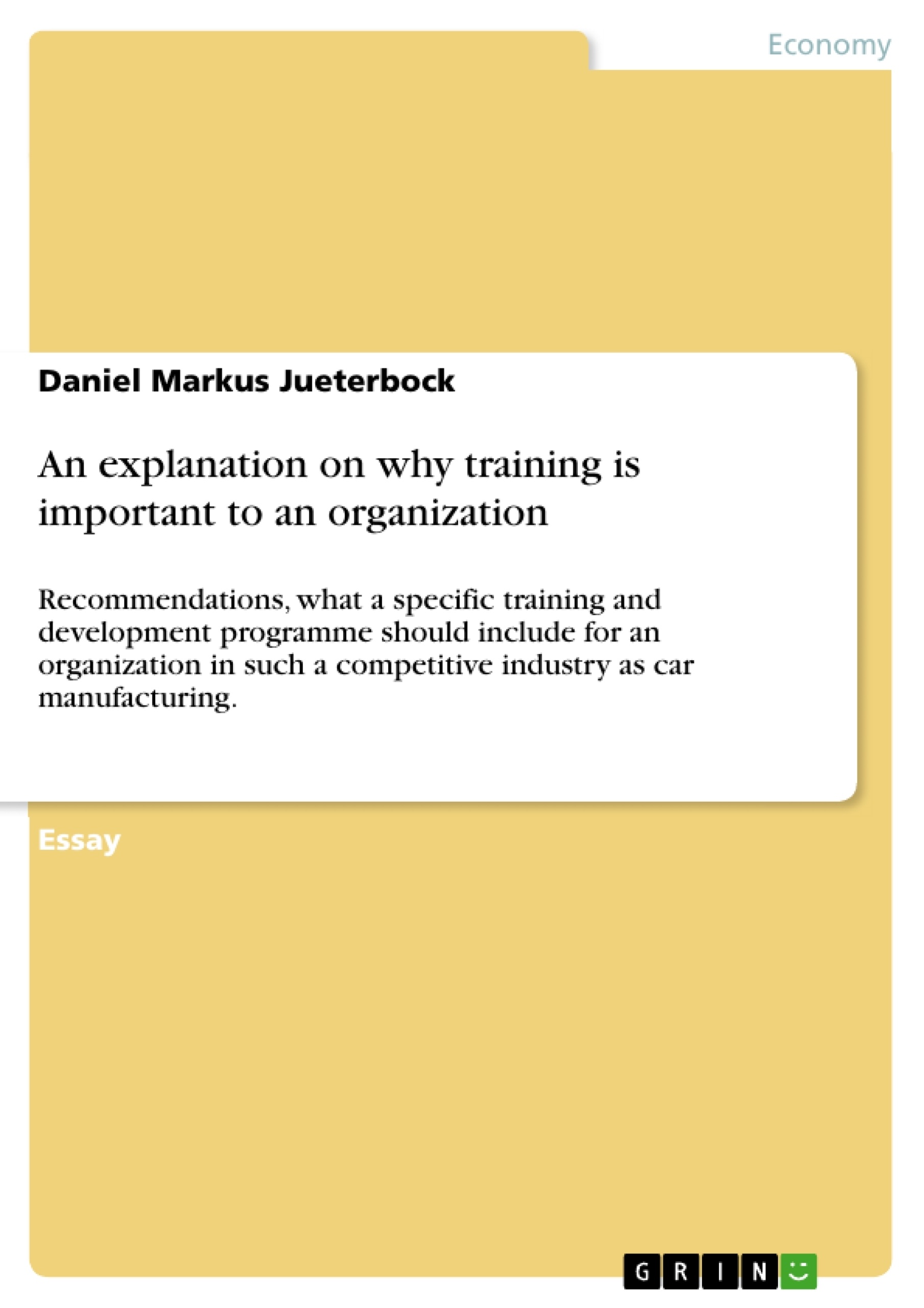To achieve its objectives a company needs a business strategy. It can choose between innovative prospector, quality enhancer or cost-defender strategy. According to that the firm has to apply an appropriate employment strategy. This can be the economic or the relational approach. The economic approach relies on hard skills whereas the relational approach focuses on behavioural skills. Depending on the employment strategy different ways of training and development come to mind for workers and managers. This report will explain the mentioned business strategies as well as the resulting employment strategies. Furthermore, means for training and development for non-managerial employees and for managers are explained. This report aims at giving recommendations for the automobile industry. Therefore, the successful automotive companies BMW, Daimler, Volkswagen, Chrysler and Toyota are examined according to their training and development opportunities. Further, it will be proven that the automobile industry applies the innovative prospector strategy and has the possibilities to invest heavily in human resources. This report shows that beside traditional training and development measures, corporate universities and e-learning support the innovative prospector strategy. The size of automobile companies enables them to invest in these costly measures. In the end, they will be critically evaluated and finally recommended.
Inhaltsverzeichnis (Table of Contents)
- Executive Summary
- Reasons Training and Development
- Business Strategy
- Employment Strategy
- Employment Strategy and Business Strategy
- Overview of Methods
- Categorization
- Non-Management Training and Development
- Management Training and Development
- Examples of Automobile Companies
- BMW
- Daimler
- Volkswagen
- Chrysler
- Toyota
- Others
- Conclusion
- Critical Evaluation of Alternatives
- Business Strategy of Automobile Manufacturers
- Possibilities for Automobile Manufacturers
- Evaluation of Common Measures in the Automobile Industry
- Recommendations
- References
- Appendix
Zielsetzung und Themenschwerpunkte (Objectives and Key Themes)
This report aims to provide insights for industry leaders regarding the significance of training and development within organizations, particularly in the highly competitive automotive manufacturing sector. The report explores the relationship between business strategy, employment strategy, and training and development programs, analyzing successful automotive companies to showcase best practices.
- The importance of training and development for organizational success.
- The link between business strategy and employment strategy in shaping training and development programs.
- The various methods and approaches to training and development for both managerial and non-managerial employees.
- Case studies of successful automotive companies and their training and development programs.
- Recommendations for effective training and development strategies in the automotive industry.
Zusammenfassung der Kapitel (Chapter Summaries)
The executive summary provides a concise overview of the report's main points, highlighting the relationship between business strategy, employment strategy, and training and development. Chapter 2 delves into the reasons for training and development, examining the different business strategies companies can adopt (innovative prospector, quality enhancer, or cost-defender) and the corresponding employment strategies (economic and relational) that influence training approaches. Chapter 3 provides a comprehensive overview of various training and development methods, categorizing them based on location, timing, and presenter. Chapter 4 examines the training and development practices of prominent automobile companies, such as BMW, Daimler, Volkswagen, Chrysler, and Toyota, highlighting their successful approaches. The report concludes with a critical evaluation of alternative training and development strategies, offering recommendations for automotive industry leaders.
Schlüsselwörter (Keywords)
The main keywords and focus topics of this report include: business strategy, employment strategy, training and development, automotive industry, innovative prospector, quality enhancer, cost-defender, economic approach, relational approach, on-the-job training, off-the-job training, corporate universities, e-learning, best practices, recommendations.
Frequently Asked Questions: Training in Organizations
Why is training important for an organization's business strategy?
Training aligns human resources with the company's goals, whether the strategy is innovation (prospector), quality enhancement, or cost defense, ensuring employees have the necessary skills.
What is the difference between an economic and a relational employment approach?
The economic approach focuses on hard skills and efficiency, while the relational approach emphasizes behavioral skills and long-term commitment between the firm and the employee.
Which training methods are common in the automobile industry?
Automobile companies like BMW and Toyota use a mix of traditional on-the-job training, off-the-job seminars, corporate universities, and modern e-learning platforms.
What is an "innovative prospector" strategy?
It is a business strategy focused on being a leader in innovation and market changes, requiring heavy investment in human resources to maintain a competitive edge.
Why do large companies invest in corporate universities?
Corporate universities allow companies to provide tailored, high-level training that directly supports their specific strategic objectives and fosters a unified corporate culture.
- Quote paper
- Daniel Markus Jueterbock (Author), 2009, An explanation on why training is important to an organization, Munich, GRIN Verlag, https://www.grin.com/document/192961



